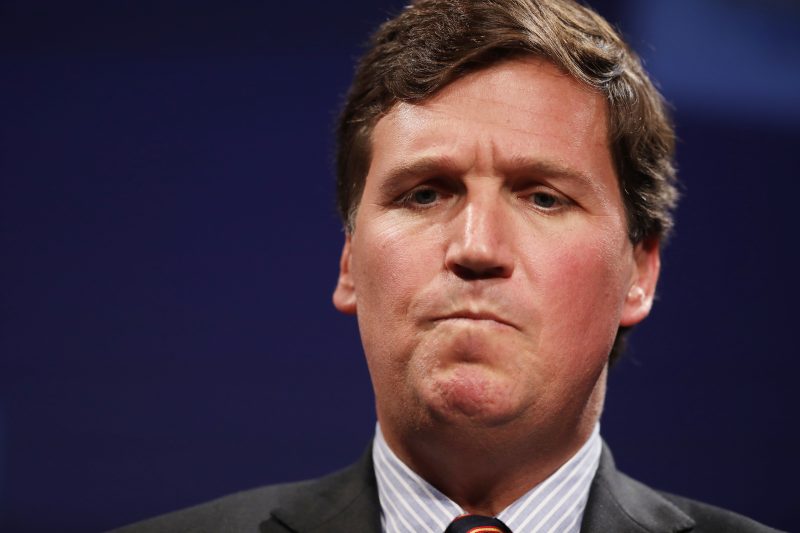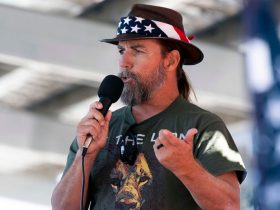As he often does, Tucker Carlson on Monday dedicated a significant part of his Fox News show to the idea that White Americans are under attack.
In this case, the predicate for Carlson’s rhetoric centered on two examples. First, that President Biden has nominated far more Black women to the courts than White men. Second, that Florida State University has scholarships that are available only to non-White students.
To the first point, Carlson complained that Biden has seen 97 judges confirmed, 22 of whom were Black women and only five of whom were White men. But, of course, the point isn’t the composition of Biden’s nominees but the composition of the bench overall. The Biden administration aims to have the judiciary better represent America’s diversity.
Donald Trump, by contrast, appointed 226 judges, only 16 percent of whom were Black, Asian, Hispanic or a race other than White. Was that lopsided balance not “race-based hiring,” as Carlson said of Biden’s nominations?
This is the heart of the issue, of course. Is the disproportionate representation of White men in leadership positions a function of their individual excellence as candidates or of U.S. systems designed to present pools of excellent candidates privileging White men? Discussions of affirmative action have long centered on this divide, but Carlson, as he often does, took the idea further.
“It’s also not about ‘looking like America,’” Carlson insisted of Biden’s picks. “It’s about punishing people.”
This is different. Efforts to better reflect American diversity and to ensure that people aren’t disadvantaged by being women or non-White have for decades been presented as working against Whites. But Carlson — who famously emailed Biden’s son Hunter in effort to facilitate his own son’s acceptance to Georgetown University — goes further, suggesting that it’s intended to punish White people.
His comments about Florida State make that explicit. Carlson was obviously reacting to a Fox News essay by Christopher Rufo, the writer and activist who has successfully made “critical race theory” a phrase used by the right to malign any race-adjacent issue or effort. Rufo characteristically paints with a broad brush as he suggests that efforts to address historic disadvantages are dangerous and unacceptable, as he does in his essay that mentions Florida State. But Carlson goes even further, taking Rufo’s mention of existing scholarships designated for non-White students and suggesting it is somehow a new development. (On the university’s website, the scholarship Rufo mentions indicates that “preference may be given applicants who are historically underrepresented.”)
Such a scholarship is “illegal but it’s also race hatred,” Carlson said. “What’s another word for it? There isn’t one. It’s race hatred.”
This is Tucker Carlson’s bread and butter. Every night, he tells his audience that they (Democrats, the government, doctors, women, you name it) want to attack and undermine us. These claims are often existential: They are going to riot; they are going to harm you; they are going to ruin your life and the country.
Fox Nation, the streaming arm of Fox News to which Carlson also contributes, has a new series centered on the ways in which America is collapsing just as Carlson warns every night. One of the three episodes focuses on “divisiveness,” as manifested in things like focusing on historic patterns of racial disadvantage.
It is certainly true that affirmative action policies, efforts to reduce the lingering effects of those disadvantages can manifest in many different ways and are often viewed with skepticism by Americans. The Supreme Court is likely to significantly scale back affirmative action programs in a decision later this year (a decision facilitated by Trump’s appointment of three White justices, we might note).
Views of affirmative action have shifted over time. The General Social Survey, conducted nationally every two years, has asked Americans for their views of affirmative action and related programs for decades. From the early 1990s to about a decade ago, the percentage of Americans who said that they saw affirmative action policies as disadvantaging Whites in hiring or promotions had declined slightly.
Notice what happened after the 2014 iteration of the GSS, though: Republican views of affirmative action as working against Whites suddenly surged, as Democratic views fell.
What happened after 2014? Well, that August a Black teenager named Michael Brown was shot and killed by a police officer in Ferguson, Mo. The Black Lives Matter movement surged to the foreground of the nation’s consciousness and brought with it new attention to ways in which racism might be built into systems of power. In the wake of the civil rights movement, the United States had done a good job of uprooting explicitly discriminatory actions within institutions such as banks and law enforcement. But there linger ways in which systems work against non-White people, particularly Black Americans, even if unintentionally.
The GSS extends back to the 1970s and has asked consistent questions since then, meaning its questions reflect a formulation of the country that is no longer accurate. For example, it asks about affirmative action policies largely through the lens of Black Americans — since most non-White Americans were Black in the years immediately following the loosening of immigration laws in the late 1960s. That’s no longer the case.
There are two questions about affirmative action concepts, one centered on the private sector and one on government actions. In each case, Democrats have long been less skeptical than Republicans; in each case, the partisan divide widened after 2014.
Private sector:
Government:
Notice the bounce among Republicans in the 2021 iteration of the government question above. The 2021 GSS was the first since 2018 because of the coronavirus pandemic. It was also therefore the first after the renewed racial justice protests of mid-2020.
Again, it is not new that Republicans aren’t supportive of affirmative-action efforts. But for most of the past 30 years, the distinction between the parties has been fairly narrow. In recent years, though, the introduction of systemic racism as a specific and ongoing point of political debate has also allowed people like Tucker Carlson to frame programs aimed at addressing subtle forms of discrimination as explicitly anti-White.
Donald Trump’s 2016 election was centered heavily on the idea that Whites were being disadvantaged by programs meant to level the national playing field. The backlash against those programs has gotten more widespread, more intricate and more alarmist in the years since.
So, on the most popular show on cable news, the host denounces a scholarship at a state school in Florida aimed at increasing the number of Black, Asian, Native American or Hispanic students who can receive an education, calling it “race hatred” against Whites. Grotesque — but, to his audience, compelling.








